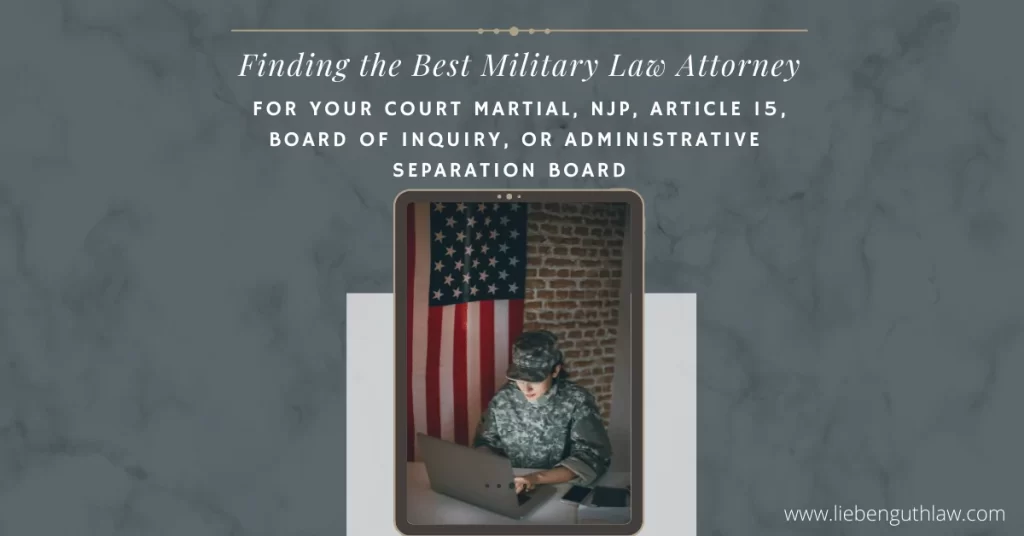
Finding the Best Military Law Attorney for Your Court Martial, NJP, Article 15, Board of Inquiry, or Administrative Separation Board
Whether you are under UCMJ investigation, facing a court martial, NJP, Article 15, Captain’s Mast, Board of Inquiry (BOI), Administrative Separation Board, or some other adverse administrative action, finding the best military law attorney for your case is critical to achieving the most favorable outcome possible. Look for these factors for choosing the right civilian military law attorney for your defense.
1. Winning Record
Past performance is the best predictor of future performance. As a result, you want an attorney that has a verifiable record of defending and winning military cases. This is the most important factor to look for. Any lawyer can make claims of success. But can they show you numerous winning court martial opinions with their name attached to it? Can they show you recorded examples of them actually performing and arguing in court? Have they won any legitimate legal awards? If the answer is no, a service member should probably put their career and future into a different attorney’s hands.
2. Exhaustive Case Preparation
You would be shocked at how little work some civilian military lawyers put into a client’s case. This is the type of attorney a service member must avoid at all costs. Properly preparing a military case often takes hundreds of hours. If you’re not 100% convinced that your military defense lawyer will go to the ends of the earth to investigate, prepare, and defend your case, find someone else.
3. Personal Attention
Experience indicates that the number one complaint by military service members against their military defense lawyer—be it a civilian or active duty JAG—is that they don’t return phone calls or emails in a timely manner, or at all. This is huge red flag. If they can’t even return your phone call or email, there’s probably a lot of other things that they’re not doing in your case. It’s your military career, reputation, and future on the line, so find someone who cares more about you and your case.
4. Straightforward, No Nonsense Analysis Without a Sales Pitch
Most military service members that are under investigation, facing a court martial, or are pending some other UCMJ action, are scared and worried. They fear prison, separation from the military, loss of benefits, and a host of other negative consequences. They’re worried about their future and the future of their loved ones. These matters make them vulnerable to slick sales pitches that overpromise but usually under deliver in a big way. If a military attorney is trying to convince you to hire them, you should think twice. What they should be doing is listening to your legal issue and then providing a straightforward legal analysis for you so you can determine your best next step.
5. Experienced, Aggressive & Professional
Experience isn’t just about quantity, it’s also about quality. A military law attorney can practice for decades, but that doesn’t necessarily mean that they have obtained the best outcomes for their service member clients. As noted above, a winning record—preferably in complex felony level cases like murder and sexual assault—can be hugely advantageous. And aggressive doesn’t mean a bull in a china shop or unlikable. Instead, it goes hand in hand with professionalism: total dedication to properly investigating, preparing, and defending a service member’s case and the courage to challenge military authority when it’s to the service member’s advantage.
6. Involves the Detailed JAG to Foster a “Defense Team”
Once hired, some civilian military lawyers shut out a detailed military defense attorney. This is usually to the client’s detriment. In most cases just because the active duty JAG is less experienced, doesn’t mean that they have nothing to offer. Your civilian military defense attorney—as lead counsel—should foster a “defense team” mentality. This can be hugely beneficial to the accused service member, as the whole can be greater than the sum of its parts. If the civilian military lawyer doesn’t have a plan for integrating your detailed military defense counsel into the defense of your case in some useful way, there are probably better options. And if your detailed JAG is so bad that you don’t even want him on the team, your civilian attorney should help you obtain a better one via an IMC (Individual Military Counsel) request.
To learn more about Mr. Liebenguth and his military law and appeals practice, visit his About page. To listen to his winning argument in an attempted murder-for-hire case that led to the reversal of a Marine’s conviction by the Navy-Marine Corps Court of Criminal Appeals, click here.
